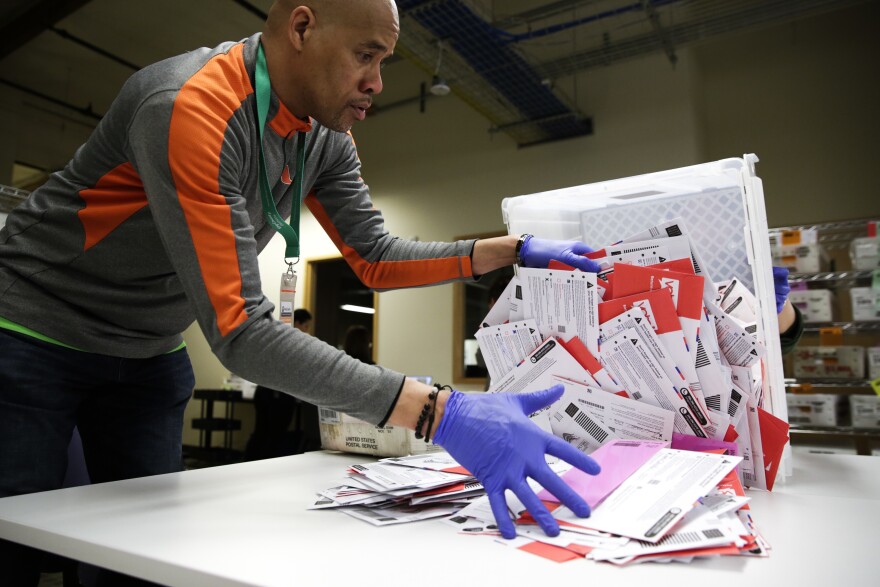With the widespread expansion of vote-by-mail this year in response to the pandemic, both major political parties and their allies are waging an intense legal battle to shape the rules around absentee and mail-in voting.
The details matter a lot and could affect the outcome in November.
Dozens of lawsuits have been filed so far, with Democrats seeking to remove mail-in voting restrictions that they say are burdensome and unconstitutional, and Republicans trying to preserve laws they say protect against voter fraud.
Among the main targets are witness and signature requirements for absentee ballots — such as signing the envelope, or getting a witness or notary to sign it, or making sure the voter's signature is legible. Such requirements — which differ from state to state — can make all the difference in whether a ballot is counted or tossed aside.
"If I don't sign my part of this, then they will throw your ballot out," Brenda Williams, a voting rights activist in Sumter County, S.C., explained to one voter she helped in the March primary. "It would not be counted at all, ever."
South Carolina is among a dozen states that usually require absentee voters to get a witness or notary to sign their ballots. Last week, a federal judge ruled that the South Carolina requirement could put voters' health at risk and suspended it for the June primary.
"We know that these signature requirements have already affected thousands of voters during the pandemic and our concern is that they'll affect thousands or even tens of thousands more as the election cycle continues," said Dale Ho, director of the ACLU's Voting Rights Project, who worked on this case and similar ones in Missouri and Virginia.
For example, Wisconsin rejected more than 14,000 absentee ballots cast in its April 7 primary because they lacked witness signatures.
Ho said the requirements also don't seem to serve much purpose. "They're not relied on by the state in any way to try to verify the authenticity of someone's vote," Ho said of the South Carolina rules. "It just seems like a hoop that they force people to jump through."
Even South Carolina election officials have admitted that the witness requirement is more of a burden than a help. "That witness signature doesn't do a lot for us, and it does a lot of harm to voters," state election commission spokesman Chris Whitmire told NPR earlier this year.
Republicans say the requirements are needed to guard against voter fraud, especially because absentee voting is more susceptible to abuse. President Trump has repeatedly complained, without evidence, that mail-in voting is riddled with fraud and "bad" for Republicans.
"In this time of uncertainty, we need to have faith in our election process," Ronna McDaniel, chairwoman of the Republican National Committee, told reporters in a recent call.
McDaniel accused Democrats of using the pandemic as an excuse to loosen laws intended to ensure that absentee ballots are valid.
"We believe that many of the lawsuits that they have initiated would destroy the integrity of our election," she said.
The RNC has committed $20 million this year to fight the Democrats' legal challenges to the signature and other mail-in voting laws, including requirements in some states that ballots must be received — and not just postmarked — by Election Day and that third parties cannot collect and deliver ballots.
The debate is playing out in courthouses and state legislatures around the country. Democrats and their allies are challenging witness requirements in North Carolina, Minnesota, Alabama and elsewhere. They also want states to give voters a chance to fix their own signatures, if there are any problems. Tens of thousands of absentee ballots are routinely rejected because they lack a voter's signature or the signature does not match the one on record.
In Oklahoma this month, voting rights groups successfully challenged a state law requiring that absentee ballots be notarized, only to have the state legislature reinstate the requirement a few days later.
"The worse thing that you can do is fraudulently vote. To me it's akin to stolen valor and this is the way we prevent that from happening," Oklahoma Republican Chris Kannady told his House colleagues shortly before the vote.
Democrats argued that the requirement would be especially harmful to low-income voters and others who might have a difficult time getting access to a notary, or providing the alternative photocopy of their ID, especially during a pandemic.
"Ever since any American has gained the right to vote, there's been an effort to restrict that right from another American," said a Democratic member of the Oklahoma House, Monroe Nichols. But the state's Republicans prevailed and Democrats are back in court challenging the new law.
The fight over absentee voting rules is so intense because both sides think it could affect the outcome of the November elections. Studies have shown that young, minority and new voters, who lean Democratic, tend to have their absentee ballots rejected more often than older, white voters who lean Republican.
Republicans are also concerned that loosening the rules will boost Democratic turnout. Trump admitted as much earlier this year, telling an interviewer that if some of the restrictions are eliminated, "you'd never have a Republican elected in this country again."
Some of the absentee ballot rules should be repealed because they're unnecessary, argues David Kimball, a political scientist at the University of Missouri in St. Louis. He noted that Missouri requires absentee ballots to be notarized even though local election clerks check the voter's signature to make sure the ballot is valid.
"I think it certainly has the effect of discouraging absentee voting, so maybe that's part of the goal too," he said of the notary requirement. It, too, is being challenged in court.
Copyright 2021 NPR. To see more, visit https://www.npr.org. 9(MDE1MjUxMDc0MDE0MDYzMDA2MjgyM2EzMg001))



